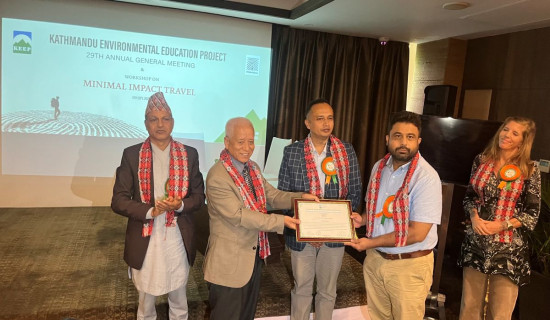- Saturday, 6 September 2025
Experts stress market-driven technical education for economic transformation
By A Staff Reporter,Kathmandu, May 5: Experts have stressed the need for Nepal to build secure data centers and provide market-driven technical education to support economic transformation.
Experts and academic leaders from around the globe have highlighted the potential of Madan Bhandari University of Science and Technology (MBUST) to address Nepal’s growing demand for practical and technical education.
This sentiment was echoed during an international conference ‘First Step towards Building a World-Class University’ organised by the university in Kathmandu on Sunday.
Former Education Minister Giriraj Mani Pokharel hailed the university's establishment as a major leap forward in Nepal’s higher education sector. He emphasised the distinct roles of universities established under different frameworks—such as health, technical, and open universities—and their contributions to fostering entrepreneurship and national development.
Richard Miller, Founding President of Olin College of Engineering, Boston, emphasised that investments in practical education represent the most meaningful form of educational development.
Expressing his commitment to supporting Nepal’s newly-established technology-focused university, he stated that producing skilled human resources requires collaboration among the government, policymakers, academia, and society.
Similarly, Bruce Flesner, former Vice President of the American University in Cairo, described Nepal as having strong potential for the successful operation of technical universities. He encouraged investors to engage enthusiastically with Madan Bhandari University, highlighting the significance of education that is directly useful in daily life.
Seeram Ramakrishna, former Deputy Vice President of the National University of Singapore, presented Singapore’s rapid academic progress as an example. He said that with clear vision and commitment to quality education, Nepal too could develop world-class institutions.
Recalling Singapore’s past energy limitations, Prof. Dr. Ramakrishna highlighted how the country now rivals Australia in solar power. He asserted that with practical education and clear national policies, even seemingly impossible goals become achievable. He also emphasized the urgent need to develop secure data centers to adapt to the changing workforce shaped by artificial intelligence.
Former World Bank Nepal Director Kenichi Ohashi urged the government to focus on productivity-enhancing policies. She advocated for practical, inclusive, and technology-friendly policymaking. “Nepal has the potential to develop effective and indigenous implementation models. Skilled students will play a vital role in this transformation,” she added.
Prof. Dr. Rajendradhwaj Joshi, President of Madan Bhandari University, said that the dream of building a world-class institution had come true. He stressed the need to maintain high academic standards and called for international collaboration to ensure long-term success. He noted that the university was conducting research in mushrooms, kiwi, organic vegetables, AI, and agriculture—attracting global research attention.
During the event, a Memorandum of Understanding (MoU) was signed between Prof. Dr. Rajendradhwaj Joshi, the President of Madan Bhandari University and Om Krishna Shrestha, Proprietor of Ares Mushroom Farm. Shrestha shared that lack of research had created challenges in starting his business but expressed commitment to assisting students in mushroom production and research.
Birendra Pandey, First Vice President of the Confederation of Nepalese Industries, said that domestic industrialists are ready to assist students with skill development and market access. He noted that his organisation also provides scholarships to student researchers and remains committed to promoting entrepreneurship.
Deepak Pandey, Chairperson of Larke Himalayan Herbal Industry Pvt. Ltd., noted the partnership with the university allows students to engage in research, lab work, and the collection and processing of Himalayan herbs.
Dr. Govinda Pokharel, former Vice President of the National Planning Commission, emphasised the need for domestic technical manpower and advocated for universities to design curricula aligned with national development goals.
Former Auditor General Bhanu Acharya said that technology transfer and research must be prioritised through a policy.






copy-original-thumb.jpg)










